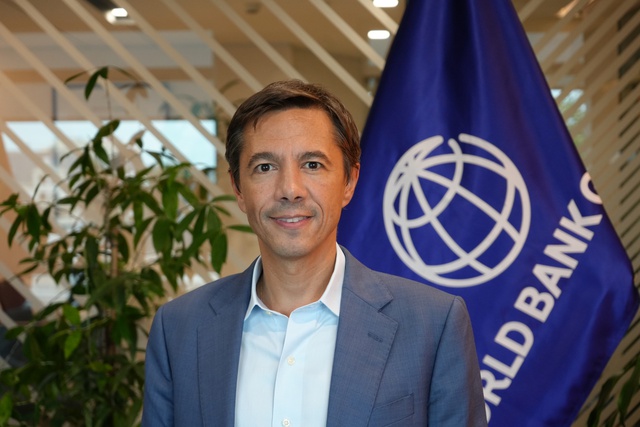Viet Nam’s economy is resilient and positive amidst challenging global context: WB
Viet Nam’s economic performance in 2023 was resilient and positive considering the very challenging global context. The country was still able to sustain a rate of growth that many other countries in the rest of the world can only dream about, according to the World Bank (WB).
Looking back at the economic picture in 2023, Andrea Coppola, Lead Economist for the World Bank in Viet Nam said, the global economic slowdown and its impact on the demand for Vietnamese exports made 2023 one of the most challenging years of the 21st century, after the very difficult 2020 and 2021 COVID years. Despite the challenges, a gradual recovery is now ongoing.
Viet Nam is considered one of the most open economies in the world. Its strong trade relations with the rest of the world are a source of strength and success. At the same time, the reliance on demand from trade partners heavily exposed Viet Nam to the global economic slowdown experienced in 2023.
Economic growth in U.S. was about 2.5 percent in 2023. In the Euro area, economic growth was even weaker at about 0.5 percent. The global economic slowdown had a strong impact on the demand for Vietnamese exports.
This external shock affected so many firms in the manufacturing sectors that focus their business on the production of goods that will be exported. Many workers in the manufacturing sector which is so important for the Vietnamese economy lost their jobs and saw their incomes affected.
This brings to the second cause behind the difficulties experienced by Vietnamese firms which is associated with domestic factors. The challenging situation experienced by many Vietnamese workers led to a deceleration of domestic consumption which affected not only firms in the manufacturing sector but also many other businesses, including in other sectors of the economy.
Three main factors boosting Viet Nam's economic recovery in 2023
Despite the global challenges, Viet Nam was able to continue growing at relatively fast rates. The last part of the 2023 showed signs of economic recovery. Authorities were able to increase public investments by about 35 percent with respect to the previous year in order to sustain economic growth, noted Andrea Coppola.
According to the WB economist, this recovery is driven by three main factors. First, a gradual recovery of external demand for Vietnamese exports. Exports and imports contraction bottomed out in mid-2023 and trade performance improved during the second half of the year.
Second, authorities played an important role to boost public investment which increased significantly with respect to 2022. Public investments are key because they support economic growth both in the short-term and the longer-term and further improving public investment management is a priority for Viet Nam.
Third, despite the strong shock that hit the economy, private consumption was resilient. The growth of retails sales which are a good proxy for private consumption was stable at about 7.5 percent since August.
These growth rates are significantly slower than what experience before the COVID-19 pandemic but despite that private consumption remains a key driver of economic growth.
Remarkably, Viet Nam raised a lot of attention in 2023. Media outlets with global reach have published articles to underscore Viet Nam's performance and potential and the visits of world leaders in Viet Nam attracted even more the attention of the international community.
Viet Nam is praised as an appealing destination for international investors because of its economic and political stability and its capacity to integrate in the global economy.
Andrea Coppola recalled an article published by the Financial Times in July pointing to the opportunities for the Vietnamese economy and that Viet Nam's economic moment is now.
In such a context, it is critical for Viet Nam to continue strengthening the business environment and attract private investors' attention to fully take advantage of the impact of global geopolitical developments on international investment and trade, he suggested.
Viet Nam needs to leverage its internal strength, boost productivity growth
Regarding Viet Nam's economic growth prospects in 2024, the WB economist said, the international context is expected to remain challenging in 2024. After the global slowdown experienced in 2023, global economic growth is expected to decelerate further in 2024, including in key trade partners for Viet Nam such as the U.S.
The expected weak performance is the result of the lagged and ongoing effects of tight monetary policy, restrictive credit conditions, and weakening global trade.
Downside risks predominate including geopolitical risks, the impact of conflicts on energy prices, financial stress associated with the increase in long-term yields, and weaker than expected activity in China.
In such a context, it would be important for Viet Nam to reduce its vulnerability to external shocks and increasingly leverage its internal strength and domestic productivity to support economic growth, he recommended.
Authorities can play an important role to support the economy though fiscal policy, particularly by accelerating the implementation of transformational public investment and infrastructure projects which are going to strengthen economic growth both in the short-term and in the longer term, Andrea Coppola continued.
Furthermore, Vietnamese people are the country's greatest source of internal strength. Vietnamese workers and entrepreneurs allowed the Vietnamese economy to grow by seven times during the last 30 years.
To sustain this fast growth, also considering the challenging external environment, he suggested Viet Nam continue promoting private sector development and boosting productivity.
Vietnamese authorities can play a key role to help the country achieving this objective, he noted, calling for doubling efforts on human capital development by upskilling the labor force and physical capital development through public investments in transport and energy infrastructure that can further strengthen the competitiveness of Vietnamese private sector.
He expressed his hope that the demand for Vietnamese exports from the rest of the world to recover in 2024, it is not going to be as strong as in the past and this challenging situation may last for some time.
"In this context, my message for Viet Nam is to leverage its internal strength and boost the productivity growth of its domestic economy to transform the challenges provided by the global economic slowdown in an opportunity to further strengthen its economic growth model", the economist shared./.
source: chinhphu.vn
More Articles
- • Japanese investors are highly interested in Viet Nam
- • Viet Nam is most attractive destination for U.S. semiconductor investors
- • Highest FDI disbursement recorded in past five years
- • Viet Nam’s stability, openness key to new FDI commitments
- • Transport ministry urged to build metro line to Hoa Lac High-tech Park
- • Gov't issues fresh regulations on foreign workers’ employment
- • Major amendments to regulations on foreign workers working in Viet Nam
- • Viet Nam climbs two notches in global innovation index 2023
- • Viet Nam on frontline to absorb quality FDI
- • Viet Nam among Southeast Asia’s most powerful magnets for FDI: Global Finance



